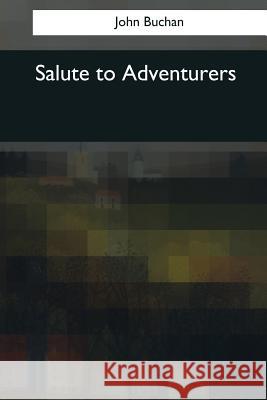Salute to Adventurers » książka
Salute to Adventurers
ISBN-13: 9781544096360 / Angielski / Miękka / 2017 / 226 str.
Salute to Adventurers
ISBN-13: 9781544096360 / Angielski / Miękka / 2017 / 226 str.
(netto: 44,57 VAT: 5%)
Najniższa cena z 30 dni: 46,80
ok. 16-18 dni roboczych.
Darmowa dostawa!
I tell lost tales of savage wars; And you have known the desert sands, The camp beneath the silver stars, The rush at dawn of Arab bands, The fruitless toil, the hopeless dream, The fainting feet, the faltering breath, While Gordon by the ancient stream Waited at ease on death. And now, aloof from camp and field, You spend your sunny autumn hours Where the green folds of Chiltern shield The nooks of Thames amid the flowers: You who have borne that name of pride, In honour clean from fear or stain, Which Talbot won by Henry's side In vanquished Aquitaine. The reader is asked to believe that most of the characters in this tale and many of the incidents have good historical warrant. The figure of Muckle John Gib will be familiar to the readers of Patrick Walker. Chapter 1 The Sweet-Singers When I was a child in short-coats a spaewife came to the town-end, and for a silver groat paid by my mother she riddled my fate. It came to little, being no more than that I should miss love and fortune in the sunlight and find them in the rain. The woman was a haggard, black-faced gipsy, and when my mother asked for more she turned on her heel and spoke gibberish; for which she was presently driven out of the place by Tarn Roberton, the baillie, and the village dogs. But the thing stuck in my memory, and together with the fact that I was a Thursday's bairn, and so, according to the old rhyme, -had far to go, - convinced me long ere I had come to man's estate that wanderings and surprises would be my portion. It is in the rain that this tale begins. I was just turned of eighteen, and in the back-end of a dripping September set out from our moorland house of Auchencairn to complete my course at Edinburgh College. The year was 1685, an ill year for our countryside; for the folk were at odds with the King's Government, about religion, and the land was full of covenants and repressions. Small wonder that I was backward with my colleging, and at an age when most lads are buckled to a calling was still attending the prelections of the Edinburgh masters. My father had blown hot and cold in politics, for he was fiery and unstable by nature, and swift to judge a cause by its latest professor. He had cast out with the Hamilton gentry, and, having broken the head of a dragoon in the change-house of Lesmahagow, had his little estate mulcted in fines. All of which, together with some natural curiosity and a family love of fighting, sent him to the ill-fated field of Bothwell Brig, from which he was lucky to escape with a bullet in the shoulder. Thereupon he had been put to the horn, and was now lying hid in a den in the mosses of Douglas Water. It was a sore business for my mother, who had the task of warding off prying eyes from our ragged household and keeping the fugitive in life. She was a Tweedside woman, as strong and staunch as an oak, and with a heart in her like Robert Bruce. And she was cheerful, too, in the worst days, and would go about the place with a bright eye and an old song on her lips. But the thing was beyond a woman's bearing; so I had perforce to forsake my colleging and take a hand with our family vexations. The life made me hard and watchful, trusting no man, and brusque and stiff towards the world. And yet all the while youth was working in me like yeast, so that a spring day or a west wind would make me forget my troubles and thirst to be about a kindlier business than skulking in a moorland dwelling.
Zawartość książki może nie spełniać oczekiwań – reklamacje nie obejmują treści, która mogła nie być redakcyjnie ani merytorycznie opracowana.











